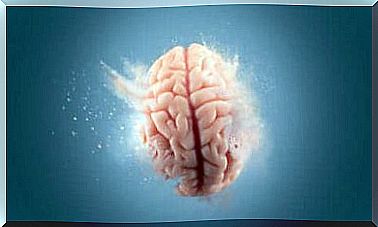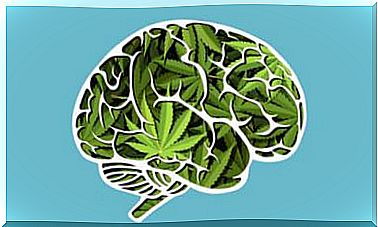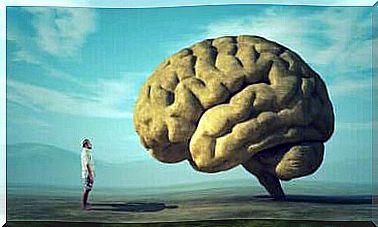Depression And Academic Performance, What Is The Link?

Installing apathy and sadness in our state of mind can have consequences for the rest of our life, thus affecting many areas of our life. Today we are going to talk about depression and academic performance. Specifically, we will examine and try to understand the relationship between these two variables.
We have all felt at some point our moods evaporate. This common development is generally accompanied by a certain social apathy. Little by little, we have less and less reinforcements. And sometimes even worse. It is in this context that we will analyze the relationship between depression and academic performance.
Academic performance
Academic performance is a measure of performance that can be expressed in absolute or relative terms. On the other hand, the evaluation of this performance will not depend only on the person who performs it.
One of the variables that would be intrinsically linked to the person would be intelligence. However, when we speak of intelligence, we are not only referring to intellectual intelligence. Psychologists, like Howard Gardner, defend the existence of different intelligences. These are naturalistic, intellectual, interpersonal, emotional intelligences, among others.
On the other hand, academic performance expresses the performance of a person in a very specific field. The school or university environment. In some cases, it is assessed based on the result of the final exam. In others, it is evaluated from time to time. Sometimes the behavior is included in the assessment, but not always.
Each venue will establish criteria for determining what a student’s performance has generally been. However, the teacher’s job, coordination, guidance, etc. can also be evaluated.

The Depression
Depression is precisely defined by the Diagnostic and Statistical Manual of Mental Disorders. Major depression is when five or more of the following symptoms are present, for at least two weeks, and they interfere with a person’s adjustment. Also, at least one of the symptoms should be that the person is in a depressed mood or loses interest or pleasure. Let’s see the symptoms:
- Depressed mood most of the day, almost every day
- Significant decrease in interest or pleasure in most activities, almost every day
- Weight loss, no diet or weight gain, or decreased or increased appetite on most days
- Insomnia or hypersomnia almost every day
- Feeling tired or losing energy
- Restlessness or psychomotor retardation feelings of helplessness or unfounded or excessive guilt (which may be delusional) almost every day
- Recurring thoughts of death (not just fear of death)
- Recurring thoughts of suicide without a specific plan, a suicide attempt or a suicide plan
- Decreased ability to concentrate or make decisions almost every day
However, this could be determined on the basis of subjective information or observations made by others. In addition, the symptoms cause clinically significant distress and interfere with important areas of function.
This episode should not be attributable to the absorption of any substance. Likewise, the person’s condition is also not best explained by schizoaffective disorder, schizophrenia, schizophreniform disorder, delusional disorder or any other specified or unspecified disorder of schizophrenia and others. psychotic disorders. In addition, there must never have been a manic or hypomanic episode.
There are other depression related disorders that share some of the symptoms listed above. In this article, however, we will focus on major depressive disorders.
What is the link between depression and academic performance?
Major depression has a profound impact on the person who suffers from it. This impact is also reflected in lower school results. However, it will have a greater or lesser influence depending on the circumstances. Let’s look at the link:
- Depression and the school or university environment. Major depression causes people to lose interest in many of the daily activities that they used to do. This idea is also transferred to the academic field
- The influence of school performance on depression. Sometimes the perception of school performance can be a risk factor for major depression
- Influence of major depression on school performance. Depression can affect concentration, decision making, attention, loss of interest, frustration, feelings of worthlessness, guilt, lack of motivation, low tolerance for frustration, etc. The presence of these symptoms can also lead to problems with academic performance. The affected person will not perform to their full potential
However, it should be noted that academic performance can be affected by the change of different variables, and not just by depression. We therefore cannot attribute poor academic performance exclusively to depression. Different factors may be present or others may intervene later.
So when we talk about the link between depression and school performance, we are referring to a two-way relationship. Depression can be a drag on school performance. And, the perception of academic performance can lead, with other factors or not, to major depression.
Even if there is not always a relationship, the possibility exists. There is a lot of research showing the association between depression and poor school performance. For example, that of Franco Mejia. Gutiérrez Agudelo and Perea, in their article for Revista Psicogente , in which they observed a statistically significant relationship between depression and the regular or poor academic performance of administration students at a public university in Santa Marta-Colombia.

How to deal with depression in the academic environment?
In order to treat depression appropriately, the participation of different stakeholders is important. Let’s see :
- Institution: the institution must ensure the well-being of its students. In this sense, many academic institutions, with the creation of an attractive dynamic, have the possibility to end up becoming a valuable protective factor against depression.
- Family: In most cases, the family is the closest to the person. She is also the one who has the most influence. His opinions and directives carry the most weight for a person who is going through depression. In this way, families can intensify depression or make it chronic. But, conversely, they can be of great help in getting the person out of this situation.
- Subject: If you know enough, you may notice the cognitive, behavioral and emotional changes you are undergoing. You can therefore seek help, either from your relatives or from the professional, as the case may be.
- Healthcare and Health Organizations: Healthcare organizations need to be prepared to deal with this type of disorder. In addition, to promote health and prevent disease
If you have the above symptoms and find that it affects both your academic performance and other areas of your life, seek help (from a psychologist or psychiatrist).
On the other hand, we are often tempted to take on more challenges than we can take on, to take on more responsibilities than we can take on. Depression is not typical of weak-tempered or unbalanced people. It is not about the person but about what happens in a certain period of time and under certain circumstances.








